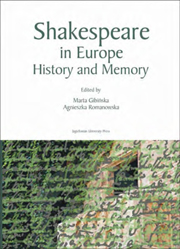Book contents
- Frontmatter
- Contents
- Preface
- Towards a European History of Henry V
- History and Histories
- History and Memory: Criticism and Reception
- History, Memory, and Ideological Appropriation
- Theatre: The Act of Memory and History in the Making
- Shakespeare Remembered by his Stuart Successors: Reflections on the 2005 “Gunpowder Season” at the Swan Theatre in Stratford
- “Who's there?” – Macbeth on the London Stage 2004–2005
- Stillness in Hamlet
- “Blood Sprinkled or Blood Spilt:” the History of Richard II Revisited in the Contemporary Theatre
- The Memory of Architecture: New Thoughts on Reconstructing old Theatres (The Case of the Gdańsk Fencing School)
- Index of Authors
“Who's there?” – Macbeth on the London Stage 2004–2005
from Theatre: The Act of Memory and History in the Making
Published online by Cambridge University Press: 05 September 2014
- Frontmatter
- Contents
- Preface
- Towards a European History of Henry V
- History and Histories
- History and Memory: Criticism and Reception
- History, Memory, and Ideological Appropriation
- Theatre: The Act of Memory and History in the Making
- Shakespeare Remembered by his Stuart Successors: Reflections on the 2005 “Gunpowder Season” at the Swan Theatre in Stratford
- “Who's there?” – Macbeth on the London Stage 2004–2005
- Stillness in Hamlet
- “Blood Sprinkled or Blood Spilt:” the History of Richard II Revisited in the Contemporary Theatre
- The Memory of Architecture: New Thoughts on Reconstructing old Theatres (The Case of the Gdańsk Fencing School)
- Index of Authors
Summary
For my students 2004–2005
I
I am holding a copy of The Daily Star of October 3rd, 2005. On page four, three severed heads look indifferently at me; these are the faces of the three latest Bali bombers. The title screams: “Decapitated Faces of Evil.” Before that, there were other such faces, heads of victims, like Ken Bigley, or shots of the London bombers of July 7th, all these reminding us of the latest war in Iraq, used as a justification for perpetrating more atrocities. Nor has current violence been connected only with Iraq. There has been the running sore of Darfur, the constant drip of news about the looting and destruction of Zimbabwe, incurred by its own government. The media throw at us daily images of Macbeth-like violence, often laced with textual references to Shakespeare's play.
When war is on the cards, Macbeth provides a powerful frame of reference. In 1999, just before the bombing of Yugoslavia, a prominent journalist wrote: “I want to put the Macbeth option: which is that we're so steeped in blood we should go further.” Three years later, during the run up to the Iraq war, the same phrase was used by another commentator to underline the responsibility of the United States for encouraging Saddam's regime during the war with Iran and for remaining friends with him while he was gassing the Kurds, by comparing their policies to that of a Macbeth “in blood stepped in so far, that should I wade no more, returning were as tedious as go o'er.” At the other end of the heated political spectrum, pro-war lobbies were using Macbeth to convey the magnitude of Saddam's atrocities.
- Type
- Chapter
- Information
- Shakespeare in EuropeHistory and Memory, pp. 277 - 290Publisher: Jagiellonian University PressPrint publication year: 2008

